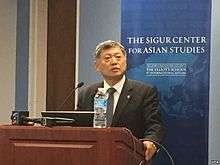Suisheng Zhao
Suisheng Zhao is a professor of Chinese politics and foreign policy at the University of Denver's Josef Korbel School of International Studies. He serves as director of the school's Center for China–US Cooperation,[1][2] and is the founding editor and the editor-in-chief of the multidisciplinary Journal of Contemporary China.[1][3][4]

Prior to arriving at the University of Denver, Zhao was an associate professor of political science at Washington College and an associate professor of East Asian politics at Colby College. He received both a bachelor's and master's degree in economics from Beijing University, and subsequently completed a second master's degree in sociology from the University of Missouri. Zhao earned his PhD in political science from the University of California, San Diego.[2]
Publications
- China and East Asian Regionalism: Economic and Security Cooperation and Institution-Building (2012)
- In Search of China’s Development Model: Beyond the Beijing Consensus (2011)
- Village Elections in China (2010)
- China and the United States: Cooperation and Competition in Northeast Asia (2008)
- China-US Relations Transformed: Perspectives and Strategic Interactions (2008)
- Debating Political Reform in China: Rule of Law versus Democratization (2006)
- A Nation-State by Construction: Dynamics of Modern Chinese Nationalism (2004)
- Chinese Foreign Policy: Pragmatism and Strategic Behavior (2003)
- China and Democracy: Reconsidering the Prospects for a Democratic China (2000)
- Across the Taiwan Strait: Mainland China, Taiwan, and the Crisis of 1995-96 (1999)
References
- 郭佳佳 (2008). Diasporic Discourses on Chinese Nationalism: Zheng Yongnian and Zhao Suisheng’s Identity Strategy of Writing China (離散者的中國民族主義: 華裔學者趙穗生, 鄭永年面對中國的身分策略). 國立臺灣大學政治學系中國大陸暨兩岸關係教學與研究中心. ISBN 978-986-01-7144-0. Retrieved 4 February 2013.
- Suisheng (Sam) Zhao Archived 2012-12-27 at the Wayback Machine, Josef Korbel School of International Studies.
- Suisheng Zhao (2004). A Nation-State by Construction: Dynamics of Modern Chinese Nationalism. Stanford University Press. ISBN 978-0-8047-5001-1. Retrieved 4 February 2013.
- Taylor & Francis Group, Journal of Contemporary China: Editorial Board, accessed 11-19-11.